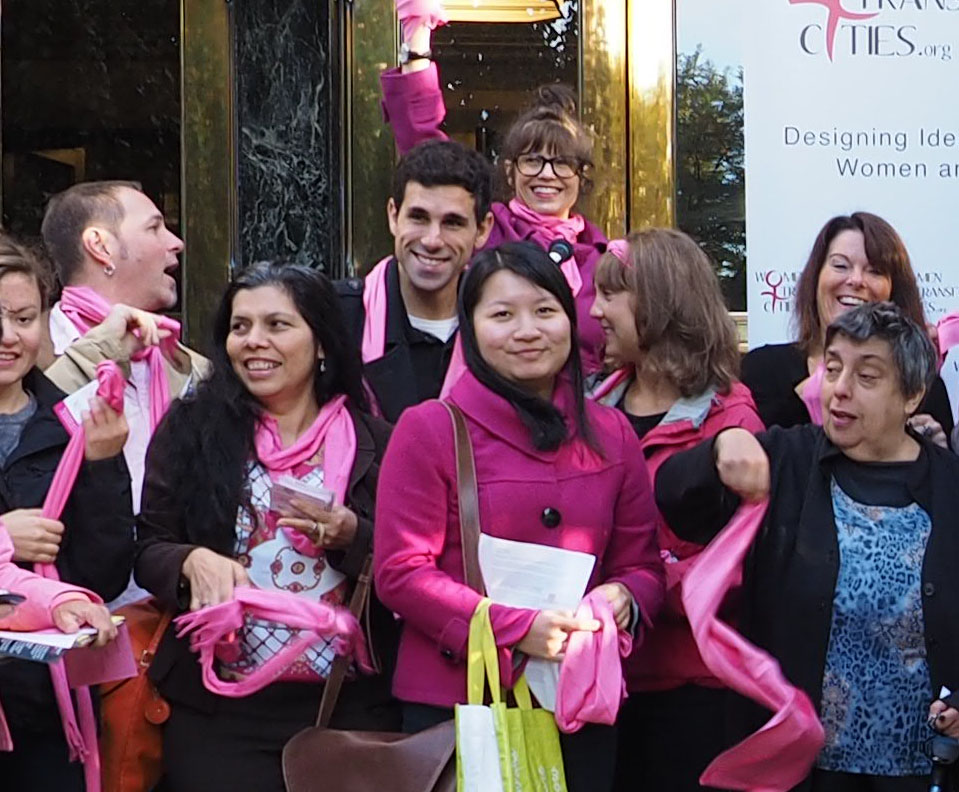We’re talking about it — we’ve been talking about it for years, in fact. The difference is that not so many people were listening before.
Women have been talking — and taking action — about violence against women, about safety on public transit, about the ways adequate affordable housing adds to security for women and girls. We’ve also been weeping in dark corners, and at gravesides and in the absence of gravesides because many women and girls, particularly Aboriginal women and girls, remain missing.
Cities are not safe places for women. Women and girls are sexually assaulted, harassed and abused in parks, at work, on the bus, in our homes. And policy-makers have not stopped it.
With municipal elections coming up in B.C. on November 15, Women Transforming Cities decided a campaign was critically needed — a campaign to alert voters, candidates and parties about the issues facing women and girls, and to put forward concrete policies and programs to knock those issues — those devastating “barriers” women and girls confront when trying to live healthy, productive lives — right off the pedestal where they’ve been holding sway over us all forever.
The issues aren’t just violence, although violence creeps in to so many aspects of women’s lives.
To learn about the priorities of women and girls, Women Transforming Cities has held monthly dialogue cafés, a national conference and a Pecha Kucha Night, in locations throughout Vancouver and surrounding municipalities.
We’ve heard hundreds and hundreds and hundreds of women and their allies, gathered around tables, telling about their experiences: they’ve been raped, they’ve lost their homes, they’re not earning a living wage and they can’t afford to buy groceries. They’d get decent jobs if they could afford child care. They’d participate in greening the planet if only there were green jobs for women, if only green initiatives like composting didn’t add one more task to the already overwhelming burden of trying to make it all work in the home, with not enough money, parents working shift work, immigrants struggling without enough supports.
Hot Pink Paper Campaign
Women Transforming Cities partnered with sister organizations and individuals to create the Hot Pink Paper Campaign. You may have seen us around, if you live in Vancouver. We’re the ones wearing hot pink, at all-candidates meetings and farmers markets and even at the theatre, and we’ve been asking candidates and parties to endorse 11 key issues in the Hot Pink Paper — and to commit to implementing the policy and programming recommendations we’ve developed.
We’ve been everywhere in the last few weeks, asking questions and educating, and we’re not going away. Because we have heard the cries from women and girls: we need institutional change. We want policies emerging from city hall that recognise the distinct and diverse circumstances of women and girls. We are not — definitely not — just like men — nor are we exactly like each other.
Accounting for diverse lives
The Hot Pink Paper Campaign advocates developing and deploying policy using an intersectional lens — a framework for looking at the world and people in terms that acknowledge diverse social categories like ethnicity, sexual preferences, gender and income and — this is key — how every person belongs to multiple categories that intersect with each other like a four-way intersection for cars only maybe we’re talking about an eight or ten-way intersection.
All people are a bit like asterisks, their diverse facets criss-crossing each other and making their realities unique. An intersectional lens takes into account diverse realities and develops policy accordingly.
Candidates making a commitment
And where has all this gotten us? Are we ‘merely’ talking some more, expanding on theories, preaching to the converted? It’s true some party and candidates’ responses have been negative; there has been a noticeably watered-down “yes” or two.
However: at a town-hall meeting hosted by the Canadian Council of Women last week, “all political parties committed to working with women’s organizations to develop and implement a comprehensive Violence Against Women and Girls Civic Action Plan,” says Ellen Woodsworth, former Vancouver City Councillor and Chair of Women Transforming Cities.
To date we have heard from every party and almost every candidate running for election in Vancouver and many of them say “Yes” to the whole range of policy asks we’ve put forward with our community partners.
Is this just more talk?
Politicians’ promises before elections are legendarily problematic, after all. Who’s to say whether anything real will happen once the elections are over and done with? That’s where we come (back) in.
I don’t just mean Women Transforming Cities and our partners (who are amazing, dedicated folks and everyone needs to learn about their work!) — I mean “we” the women and girls and allies who have been talking, and working and moving toward this point where news about a Canadian TV and radio host shows us how much harm and oppression is still going on, and Aboriginal women and girls are still being murdered and going missing, and young women are feeling like what the hell happened, we were told life would be better than it was for our mothers… women, girls and our allies will not stop until changes are made at Vancouver City Hall and in cities across the country.
Christine O’Fallon is a Vancouver-based independent researcher and a member of the Board of Women Transforming Cities. As a woman with disabilities, Christine actively supports intersectional approaches to policy-making in all settings of city life. Details of political parties’ and candidates’ responses to 11 key issues in the Hot Pink Paper can be accessed online at womentransformingcities.org.



